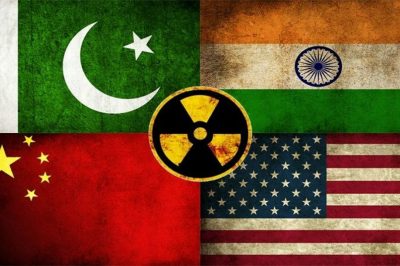Nuclear deterrence is the cornerstone of Pakistan’s national security strategy in response to India’s expanding nuclear ambitions. On 28 May 1998, Pakistan achieved credible nuclear deterrence, a milestone commemorated by honoring the scientists who enhanced the nation’s security against potential Indian nuclear threats.
India’s nuclear test of a fission device in 1974, known as ‘Smiling Buddha,’ prompted Pakistan to embark on a challenging journey to develop its nuclear arsenal. India’s assertion of conducting a nuclear explosion in 1974 heightened the risk of a nuclear arms race in South Asia. To restore the strategic balance disrupted by New Delhi, Pakistan devised a comprehensive strategy to achieve nuclear deterrence.
During the 1970s, global reluctance to pressure New Delhi into abandoning its nuclear ambitions allowed India to advance its prestigious nuclear weapons program. International efforts, such as the formation of the Nuclear Suppliers Group (NSG), were tentative and largely ineffective in curbing Indian nuclear proliferation. Pakistan recognized the NSG’s establishment as a shallow commitment, a view substantiated by contemporary efforts to grant India NSG membership.
Long before India’s first nuclear test, Pakistan advocated for the denuclearization of South Asia. In September 1972, Pakistani representative Munir Ahmad Khan proposed a framework at the 16th annual session of the UN Atomic Energy Conference, similar to the Tlatelolco Treaty, which aimed to denuclearize Latin America.
Again, in 1978 and 1979, Pakistan proposed two strategically significant initiatives to India. First, Islamabad suggested a bilateral agreement to renounce the acquisition of nuclear weapons. Second, it offered the opportunity for both countries to adhere to the Nuclear Non-Proliferation Treaty (NPT) simultaneously.
India rejected these proposals, as the international community neither supported Islamabad’s initiatives nor pressured New Delhi to embrace these nuclear non-proliferation efforts. Nuclear deterrence is the cornerstone of Pakistan’s national security strategy.
Also Read: Navigating Geopolitics and Ethics of Cybersecurity and AI
For nearly three decades, Pakistan showed restraint, hoping that global powers would help establish a secure path to a nuclear-free South Asia. However, the world largely ignored India’s nuclear weapons program. In May 1998, India conducted a series of nuclear tests, ending decades of ambiguity about its nuclear ambitions. Instead of holding India accountable, the West pressured Pakistan not to respond in kind.
This time, however, Pakistan refused to remain passive and conducted five underground nuclear tests. The primary objective was to achieve self-reliance and protect against potential Indian aggression. It was India that disrupted the regional power balance and initiated the nuclear arms race in the region. In South Asia, Pakistan has always been responsible for restoring strategic stability.
In recent years, India has significantly expanded its nuclear capabilities, particularly following the 2008 civil nuclear cooperation deal with the United States. This agreement marked a policy shift by the U.S. aimed at countering the rise of China. As a result, the U.S. has politically, economically, and strategically favored India, granting it country-specific IAEA safeguards, a waiver to trade nuclear materials with Nuclear Suppliers Group (NSG) member states, and entry into the Missile Technology Control Regime (MTCR).
Unfortunately, this U.S. support has exacerbated regional tensions, positioning India as a primary destabilizing force in South Asia. India’s unchecked military modernization, coupled with discriminatory international defense cooperation, undermines the delicate conventional parity between India and Pakistan.
Despite Pakistan’s historical efforts to advocate for a nuclear-free South Asia, the international community has largely ignored these initiatives. However, the global community, particularly the U.S., still has the opportunity to improve the strategic situation in South Asia by adopting fair and balanced policies.
India must be politically pressured to abandon its military and nuclear ambitions. The 2008 NSG waiver for India should be revoked to prevent further accumulation of nuclear fissile material and to strengthen non-proliferation regimes.
Additionally, India’s MTCR membership requires reassessment, as it facilitates the development of its missile delivery systems. India’s substantial military expenditures and pursuit of advanced weaponry threaten regional stability. India initiated the nuclear arms race in South Asia, while Pakistan has consistently shown restraint in efforts to prevent this escalation.

International Relations student with solid academic basis in Diplomatic Relations, International Law and Intercultural Communication. Her writings focus on international relations, feminism and current trends.







